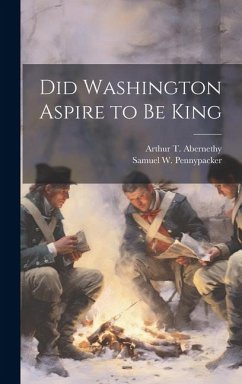This provocative study of a long-standing historical question, first published in 1948, challenges the popular assumption that George Washington rejected the idea of becoming king during the early years of the United States. Arthur Talmage Abernethy and Samuel Whitaker Pennypacker argue that the evidence suggests otherwise, and that Washington's actual views on the subject were far more complex and nuanced than is commonly believed. The book provides a fascinating glimpse into the political and cultural debates of the late 18th century, and offers a fresh perspective on one of America's most iconic figures. This work has been selected by scholars as being culturally important, and is part of the knowledge base of civilization as we know it. This work is in the "public domain in the United States of America, and possibly other nations. Within the United States, you may freely copy and distribute this work, as no entity (individual or corporate) has a copyright on the body of the work. Scholars believe, and we concur, that this work is important enough to be preserved, reproduced, and made generally available to the public. We appreciate your support of the preservation process, and thank you for being an important part of keeping this knowledge alive and relevant.
